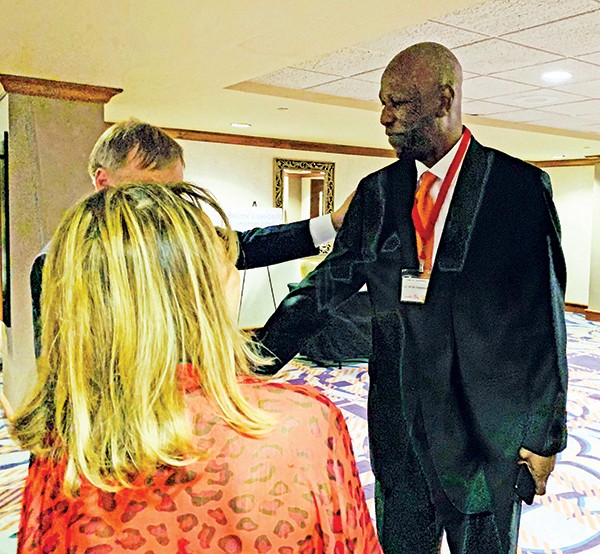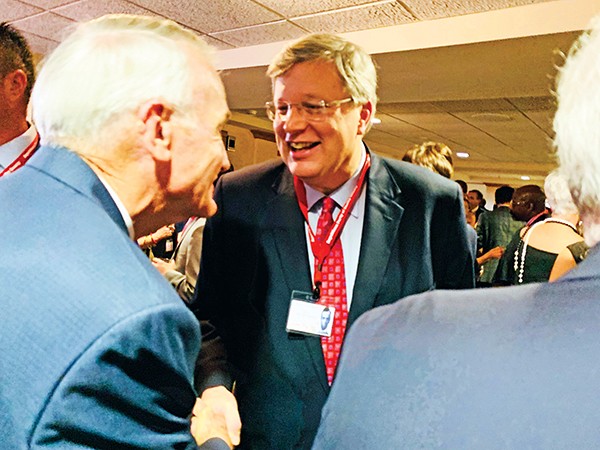With little more than a month left in the city election contest, the bad news is that there will almost certainly be no public debate featuring the three major candidates for mayor against each other.
The key point is that former Mayor Willie Herenton will not debate. He has made his position clear, most recently last Friday night, on the occasion of the Shelby County Republican Party’s annual Lincoln Day banquet, which both he and Mayor Jim Strickland attended. (Mayoral candidate Tami Sawyer harshly criticized them both for doing so.)
In between bouts of glad-handing with the GOP gentry, Herenton engaged in a running criticism of the local news media, which he maintains have never treated him fairly. He somehow drew a connection between that highly arguable premise and the concept of facing off, even if independently of any direct control by the media, against his mayoral opponents.

Herenton shmoozing at GOP dinner
“I understand the idea of ‘fake news,'” said Herenton. “I’ve always had to deal with it myself.” He said he was writing a book about his public life as superintendent and mayor, one that would feature numerous instances of bad faith treatment of him by the media.
The former mayor formally rejected an invitation to appear in a now-aborted September 19th debate co-sponsored by several local entities, including The Commercial Appeal, the NAACP, and WMC-TV, which had planned to televise it. He seemed to be irritated by the fact that the affair was established as to time and place before he was notified of it, though he indicated that he would have been disinclined to participate in any case.
Herenton’s refusal to be involved led to the cancellation of the event, inasmuch as Strickland had made it clear that he would not consent to any debate format involving Sawyer that did not also involve Herenton. Strickland had initially accepted the debate invitation “conditionally” but withdrew his willingness to participate in the wake of Herenton’s refusal.
Only Sawyer and LeMichael Wilson, the other two candidates who had met the benchmark requirement of having raised at least $30,000, had made unqualified acceptances of the debate invitation. And Sawyer has been especially avid for an opportunity to appear on the same stage as Strickland, who has been just as determined to avoid any situation that had the appearance of being a one-on-one with her, or anything close to it. A debate sans Herenton would, in his estimation, have created that situation.
 Photographs by Jackson Baker
Photographs by Jackson Baker
Strickland at GOP Lincoln Day dinner
Bad feeling between Strickland and Sawyer has persisted at least since the prolonged public debate involving removal of the city’s Downtown Confederate monuments.
As a councilman, Strickland had voted in favor of removing the statues of Nathan Bedford Forrest and Jefferson Davis from their pedestals in Downtown parks. And, as mayor, he worked through existing legal channels to have them removed, until, repeatedly rebuffed by the state Historical Commission, he and legal advisor Bruce McMullen hit upon the expedient of deeding the parks over to an ad hoc nonprofit organization, which then removed them.
But Sawyer, whose Take ‘Em Down 901 organization was at the forefront of public protests demanding removal of the monuments, had been dissatisfied with the mayor’s leadership in the process of removal, deeming it slow, over-cautious, and too accepting of existing legal obstacles. She oversaw daily vigils at the site of the Forrest statue, demanding radical and immediate action.
In the aftermath of the statues’ removal, both Strickland and Sawyer received their share of kudos, but each felt that the other had received too much credit.
In the current campaign, Sawyer has continued her harsh criticism of the mayor and what she considers his unresponsiveness to social needs in the community at large. She campaigned locally with CNN pundit Angela Rye and did not repudiate Rye’s statement that Strickland was a “racist.”
As of now, in any case, the three major mayoral campaigns are all proceeding along separate pathways, with no opportunity for joint appearances or collegial presentations. Another likely casualty of this circumstance is a Mayoral Candidate Meet-and-Greet, co-sponsored by the League of Women Voters and the Tennessee Nurses Association and set for Friday, September 6th, at the National Civil Rights Museum. Herenton had also reportedly turned down an invitation to debate from the Urban League.
While at the Lincoln Day dinner on Friday night, Herenton explained to the Flyer and Peg Watkins of the League of Women Voters, which is continuing to seek his participation in its meet-and-greet, that his campaign strategy would be based on a series of meetings which he would control — an instance of which was a Women for Herenton rally held on Saturday in South Memphis.
At the rally, attended by upwards of 1,000 women, virtually all African-American, Herenton told the attendees, “I don’t mind telling you what part of our strategy is. We’re going to win the election in early voting. We’re going to have a caravan of buses. We’re going to have vans called the Herenton Express. We’ll do an early voting like they have never seen before.”
Sawyer, who has been holding a series of neighborhood meet-and-greets, has built up something of a Midtown base. She also got a boost this week with a public endorsement from Our Revolution, the national progressive organization that was founded as an offshoot of the 2016 presidential campaign waged by Bernie Sanders. She also tweeted with justifiable pride an endorsement by Hillary Clinton via the progressive vehicle Run for Something.
Strickland, meanwhile, has launched an extensive series of radio and TV ads touting his accomplishments and has indicated he is prepared to spend every penny of the $1 million in his campaign budget in the course of this election battle.
Editor’s note: In an earlier version of this story, it was inferred that candidate Tami Sawyer was connected to a protest by a group of activists who intruded on Mayor Strickland’s lawn. Sawyer was not a participant in that event. — BV